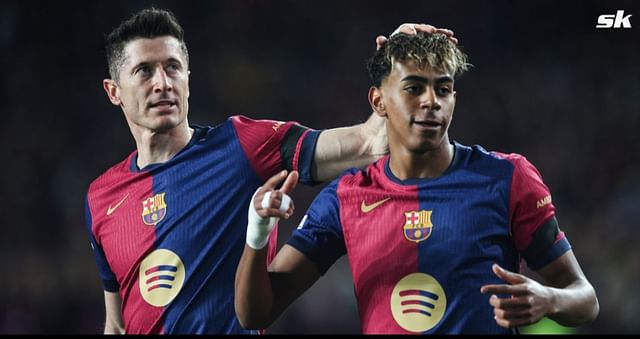FC Barcelona, one of the most iconic football clubs in Europe, is once again at the center of controversy following serious allegations of financial misconduct. The club is reportedly facing the possibility of a ban from the 2025–26 UEFA Champions League due to breaches of Financial Fair Play (FFP) regulations.
According to recent reports, UEFA has identified irregularities in the way Barcelona reported certain financial activities. The findings suggest that the club may have attempted to circumvent established rules through questionable revenue declarations, particularly involving asset sales that UEFA has refused to recognize under its regulations.
Barcelona had already been sanctioned in 2024 for violating UEFA’s FFP framework. At the time, the Court of Arbitration for Sport (CAS) fined the Catalan giants £420,000. The fine was accompanied by a clear warning: should the club commit a similar violation in the future, it could face a ban from UEFA competitions.
Despite that warning, Barcelona’s efforts to stabilize their financial position have now led them into deeper trouble. The club had sanctioned the sale of portions of its broadcasting rights and a stake in its in-house content production company. While these moves may have improved the club’s short-term liquidity, UEFA has ruled that the revenues from these sales do not qualify as operational income under FFP standards.
Instead, UEFA categorized the funds as profit from the disposal of intangible assets, thereby excluding them from the club’s official financial record for the purpose of competition licensing. This technical classification is significant because it essentially means Barcelona remains in violation of the FFP threshold for allowable losses.
The consequences of this ruling could be far-reaching. UEFA may decide to impose a full exclusion from the 2025–26 Champions League campaign. Alternatively, other forms of punishment such as a deduction of group-stage points or a restriction on the number of players Barcelona can register for the tournament could also be enforced.
For Hansi Flick, who led Barcelona to the La Liga title in the 2024–25 season after taking over as head coach, this development comes as a major blow. Just when the club appeared to be turning a corner competitively, they now risk being sidelined from Europe’s biggest stage due to off-field decisions.
Beyond the sporting implications, the financial consequences of a Champions League ban would be devastating. Participation in the competition brings in massive revenues from TV rights, sponsorships, ticket sales, and performance bonuses. Missing out would put additional strain on an already fragile financial structure at the club.
Barcelona’s current financial strategy has relied heavily on what they call “economic levers” — essentially asset sales or future revenue projections turned into immediate cash injections. While these maneuvers have allowed the club to remain active in the transfer market, they have not always been well received by regulators.
Club president Joan Laporta, who returned to office in 2021 pledging to bring financial transparency and stability, now finds himself at a critical crossroads. His administration has been both praised and criticized for its aggressive financial moves — actions that may have now backfired with serious consequences.
Meanwhile, Barcelona is still active in the transfer market, pursuing young talents to bolster their squad. Reports indicate that the club is close to finalizing a deal to sign Roony Bardghji, a 19-year-old Swedish winger from FC Copenhagen. The move is seen as part of a broader push to improve squad depth ahead of the upcoming season.
According to sources, Barcelona’s offer of £2 million for Bardghji has been accepted by Copenhagen. The Danish side is also expected to retain a 15% sell-on clause. The teenager, who previously suffered a major ACL injury during the 2023–24 season, had declined to extend his contract with the club, prompting Copenhagen to cash in before he could leave on a free transfer in December.
Interestingly, FC Porto had also submitted an accepted offer for the player, but Bardghji reportedly prefers a move to Spain over Portugal. He is expected to join Barcelona officially in July, assuming no regulatory or registration obstacles arise from UEFA’s looming verdict.
While Bardghji’s signing reflects the club’s continued ambition to attract Europe’s top young talents, it also raises questions about Barcelona’s financial priorities. Critics argue that continuing to spend, even modestly, while under investigation could be seen as reckless or even defiant in the eyes of UEFA.
This episode marks yet another chapter in Barcelona’s ongoing financial saga — one that began years ago with lavish spending, spiraling wage bills, and questionable decision-making at the executive level. Though the club has made strides in trimming its payroll and reimagining its strategy, the legacy of past missteps continues to haunt them.
As UEFA prepares to make a final decision in the coming weeks, the stakes could not be higher. Not only is Barcelona’s participation in next season’s Champions League on the line, but the verdict could also set a precedent for how UEFA handles similar cases moving forward.
For now, the players, staff, and fans are left waiting in uncertainty. What should have been a celebratory summer following domestic triumph has been overshadowed by anxiety and legal complexities. Even if the club escapes a full ban, the damage to its image and credibility may take much longer to repair.
Barcelona, a club that once prided itself on its motto “Més que un club” — more than a club — now finds itself at a critical juncture. Whether they emerge from this crisis stronger or suffer long-term consequences will depend largely on UEFA’s ruling and how the club chooses to respond in the aftermath.



